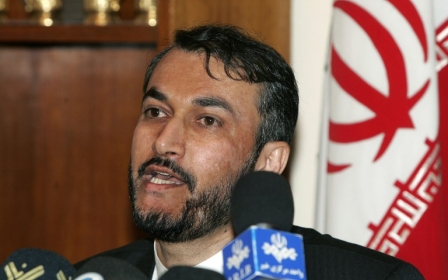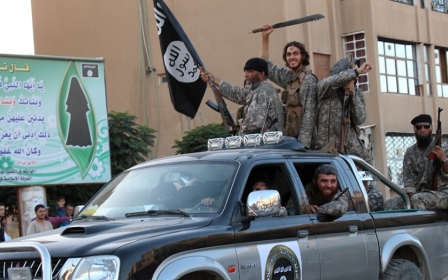Syria and US fight common enemy but not as one

Syria and the United States find themselves on the same side of the battle against Islamic State militants, but a common enemy is unlikely to mean direct cooperation.
Washington began carrying out air strikes against the extremist group in Iraq earlier this month, and the Syrian government has also stepped up raids against the militants on its own territory.
But there is little love lost, with Syria angered by US support for anti-government rebels.
For its part Washington accuses Damascus of having allowed Islamic State to flourish so as to paint its opponents as extremists.
IS posted a video Tuesday showing the apparent execution of American journalist James Foley who has been missing since he was seized in Syria in November 2012.
The Islamist group threatened to kill a second reporter unless the United States halts its air strikes in Iraq.
Damascus has looked with suspicion at the American air strikes that began in Iraq on 8 August, concerned they could lead to broader US action against both jihadists and regime forces in Syria.
"In striking IS, Damascus is telling the Americans that it doesn't need its air force against the IS," said Waddah Abed Rabbo, director of Syria's pro-government Al-Watan newspaper.
"We have treated America as an adversary for three years and six months," said Bassam Abu Abdullah, director of the Centre for Strategic Studies in Damascus.
"It is possible that the Americans will be convinced now of the necessity of cooperating with Syria, but Syria refuses any military or security collaboration without a deal on the political level."
Earlier this year, European intelligence services began reaching out to Damascus, worried about the influx of Europeans coming to Syria to join the ranks of militant groups battling the regime.
'Tacit recognition'
But Syrian officials said they had no interest in cooperation on security issues without a political deal.
And the United States denies any interest in rapprochement with Damascus, even if they find themselves with a common enemy in the Islamic State.
"I would strongly disagree with the notion that we are on the same page here in terms of what we're doing," said US State Department deputy spokeswoman Marie Harf.
She repeated the US government's line that the Syrian regime helped strengthen IS by failing to attack it until recently.
And she said US involvement in Iraq didn't mean US strikes in Syria.
"In Iraq, we have a government that has asked for our help and asked for our support and welcomed us in. That obviously is not the case in Syria."
Experts, too, see little room for reconciliation between Damascus and Washington on the basis of their shared fight.
"The most that will happen is that there will be a tacit recognition that the US, Syria and Iraq are all co-belligerents in an armed conflict against IS," said Jens David Ohlin, a professor at Cornell University.
Nikolaos van Dam, a former ambassador to Syria and expert on the country, said Damascus would struggle to convince the West to partner with it against IS.
"Western countries do not want to be seen as collaborating with Assad, even if this would practically be better from a wider strategic point of view," he said.
In a rare moment of unity last Friday, the UN Security Council voted unanimously on a resolution aimed at weakening militants in Iraq and Syria.
Nevertheless, Britain's envoy, Mark Lyall Grant ambassador shot down Syrian ambassador Bashar Jaafari's insistence that Damascus was a "necessary partner in the fight against terrorism."
"It is Assad who is in large part the cause of terrorism; he is certainly not the solution to it," he said.
In the absence of Western support, Damascus is likely to play the victim and continue to hit IS, according to Lina Khatib, director of the Carnegie Middle East Centre think-tank.
"If the regime does not get positive signs from the West, it is likely to... multiply its raids against IS to present itself as an empowered victim that is denied international support but that is capable of taking on its enemies."
Syria army bastion
Meanwhile, Syrian army forces battled Wednesday to hold onto their last stronghold in the northern province of Raqa, under fierce attack from Islamic State militants, a monitoring group said.
The Syrian Observatory for Human Rights said IS fighters had been attacking Tabqa military airport for around 10 days, but the fighting overnight from Tuesday was the heaviest yet.
At least five militants have been killed in the fighting, which has involved medium and heavy weaponry as well as air raids by regime troops.
Tabqa airport is the last remaining stronghold of Syrian troops in Raqa province, which has been largely overrun by IS fighters.
The extremist group controls the provincial capital, which was captured by other rebel groups in March 2013 but later seized by the IS.
In early August, it captured the key Brigade 93 army base in Raqa, not long after taking the military's Division 17, where at least 85 people were killed in fighting or summarily executed.
The latest IS advances in Raqa and Aleppo province, also in northern Syria, have prompted the Syrian government to launch intensive air strikes against IS for the first time,
Rebel groups have often accused the regime of avoiding attacks on IS because the Sunni extremist group has battled more moderate rebel forces.
The IS emerged from the Iraqi affiliate of Al-Qaeda but has since rejected its leadership.
It initially worked alongside other rebel groups in Syria, but they turned against it because of its abuses and its bid to dominate seized territory.
But it continues to draw recruits, and on Twitter its supporters expressed delight about the attack on the Tabqa base.
"The lions of the Islamic State have announced a war without mercy. It is time to cut of the heads of the Nussayris," one supporter tweeted, using a pejorative term for Alawites, an offshoot of Shiite Islam to which President Bashar al-Assad belongs.
New MEE newsletter: Jerusalem Dispatch
Sign up to get the latest insights and analysis on Israel-Palestine, alongside Turkey Unpacked and other MEE newsletters
Middle East Eye delivers independent and unrivalled coverage and analysis of the Middle East, North Africa and beyond. To learn more about republishing this content and the associated fees, please fill out this form. More about MEE can be found here.




